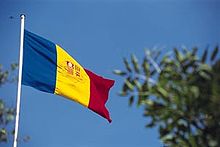El gran Carlemany
| English: The Great Charlemagne | |
|---|---|
 | |
National anthem of Andorra | |
| Lyrics | Juan Benlloch i Vivó |
| Music | Enric Marfany Bons |
| Adopted | 8 September 1921 |
| Audio sample | |
Official band instrumental version | |
"El gran Carlemany" (pronounced
History
"El Gran Carlemany" was composed by Enric Marfany Bons (1871–1942),
Lyrics
The lyrics of "El Gran Carlemany" give a short account of Andorra's history "in a
The hymn begins with "El gran Carlemany mon pare" ("Great Charlemagne my father")[11] and memorialises this view and celebrates the country's status as "the only remaining daughter of the Carolingian empire",[12] since it is the only remnant of the Marca Hispanica.[9]
| Catalan original[13][14][15] | Spanish translation[16] | French translation[17] | English translation | |
|---|---|---|---|---|
El gran Carlemany, mon pare, |
[el‿ɣɾan kaɾ.le.ˈmaɲ | mon ˈpa.ɾe |] |
El gran Carlomagno, mi padre, |
Le Grand Charlemagne mon père |
The great Charlemagne, my father, |
Notes
- ^ See Help:IPA/Catalan and Catalan phonology.
- varieties of Catalan, it is replaced with the full form.[20]
- Northwestern Catalan of Andorra.[23]
References
- ISBN 978-2-87009-632-1.
- ^ a b c Augustin (2008), p. 99.
- ^ Lichfield, John (2 September 2006). "The Not-so-Rough Guide to Andorra – The land that Europe forgot". The Independent. London. pp. 26–27. Retrieved 7 May 2014. (subscription required)
- ^ a b c "Andorra". The World Factbook. CIA. Retrieved 7 May 2014.
- ^ "Country's Profile – Andorra". Sochi2014.com. Sochi 2014 Olympics. Archived from the original on 6 April 2014. Retrieved 7 May 2014.
- ^ Principat D'Andorra, 1278–1978: È Centenari de la Signatura Dels Pareatges – Recull Oficial D'informació. Casa de la Vall. 1978.
- ^ ISSN 1432-3567. Retrieved 8 May 2014.
- ^ Principat D'Andorra, 1278–1978: È Centenari de la Signatura Dels Pareatges : Recull Oficial D'informació. Casa de la Vall. 1978.
- ^ ISBN 9781610691062.
- ^ Pineda, Enric Bassegoda (2010). "Carlemany No Va Conquerir Girona". Revista de Girona (in Catalan). 261. Diputació de Girona: 39. Retrieved 8 May 2014.
- ISBN 9780471886228.
- ISBN 9781135936969.
- ^ "The anthem of the Principality of Andorra". www.consellgeneral.ad. Archived from the original on 13 November 2007. Retrieved 23 December 2021.
- ^ "SYMBOLES PRINCIPAUTE ANDORRE Andorra Ambassade Andorre Culture Andorre tourisme". www.andorra.be. Archived from the original on 28 April 2005. Retrieved 23 December 2021.
- ^ "Himno nacional del Principado de Andorra". www.andorramania.net. Archived from the original on 12 June 2006. Retrieved 23 December 2021.
- ^ "National Anthems & Patriotic Songs - Andorran National Anthem - El Gran Carlemany lyrics + Spanish translation". lyricstranslate.com. Retrieved 13 April 2022.
- ^ "National Anthems & Patriotic Songs - Andorran National Anthem - El Gran Carlemany lyrics + French translation". lyricstranslate.com. Retrieved 13 April 2022.
- ISBN 978-0-8047-3373-1.
- ^ Escholier, Raymond (1962). Mes Pyrénées de Gavarnie au Canigou (in French). Arthaud. p. 165.
- ^ "Gramàtica essencial de la llengua catalana - Institut d'Estudis Catalans". geiec.iec.cat. Retrieved 2 January 2022.
- ISBN 978-0-14-196048-7.
- ISBN 978-84-8415-820-2.
- ISBN 978-84-7283-798-0.
In Ibizan and Western Catalan, on the other hand, after a period of coexistence, dos has triumphed as the feminine ...
